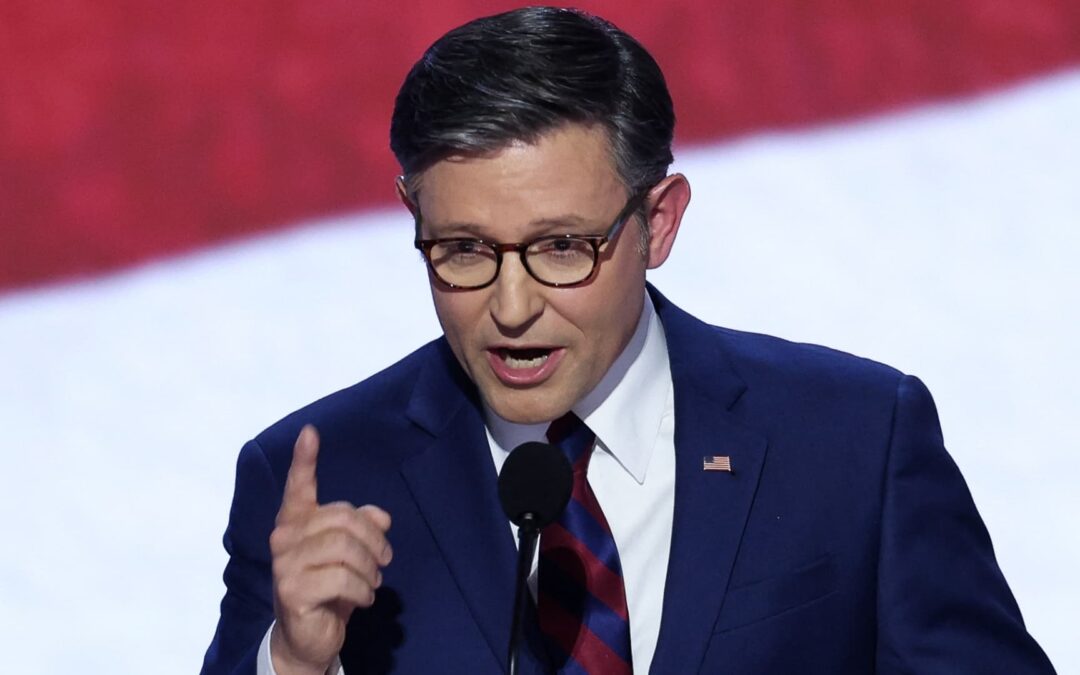Here are the most important news items that investors need to start their trading day:
1. Rate relief
Investors cheered the Federal Reserve’s huge policy move last week. The question now is what the central bank will do next. The S&P 500, Dow Jones Industrial Average and Nasdaq Composite all rose more than 1% for the week, as the Dow closed at a record high Friday. The moves followed the Fed’s decision to cut interest rates by 0.5 percentage points on Wednesday. All eyes now turn to the next policy meeting in November, where the Fed is again expected to reduce rates — though coming economic data will determine whether the central bank will choose to cut them by 25 basis points or 50 basis points. Remarks from multiple Fed officials this week will give clues into where policymakers are leaning. Follow live market updates.
2. Shutdown watch
House Speaker Mike Johnson (R-LA) speaks during Day 2 of the Republican National Convention (RNC), at the Fiserv Forum in Milwaukee, Wisconsin, U.S., July 16, 2024.
Mike Segar | Reuters
The U.S. government is careening toward a shutdown. Congress has only a week to pass a spending bill or let funding for major parts of the government lapse only about a month before the 2024 election. On Sunday, Republican House Speaker Mike Johnson introduced a new proposal to keep the government running through Dec. 20. The plan does not include provisions backed by former President Donald Trump that would require people to show proof of citizenship to register to vote — which a previous GOP spending bill did. The legislation could go to the floor of the Republican-held House as early as Wednesday.
3. A haul for Harris
Democratic presidential nominee and U.S. Vice President Kamala Harris reacts as she addresses the Congressional Hispanic Caucus Institute’s 47th Annual Leadership Conference in Washington U.S., September 18, 2024.
Tom Brenner | Reuters
Democratic presidential nominee Kamala Harris entered the final stretch of the 2024 presidential campaign with a substantial cash edge over Republican nominee Donald Trump. The vice president’s campaign had $404 million available at the end of August, compared to $295 million for the former president’s campaign, according to new filings. Harris raised $189 million in August, more than quadruple the $44 million taken in by Trump (though the figures do not include other arms of their political operations). Those numbers come as recent polling shows a tight race for the White House. A new NBC News poll found Harris held a 5 percentage point lead over Trump with registered voters nationwide, an improvement from recent months but still within the survey’s margin of error. While Harris said she accepted CNN’s invitation for a second presidential debate with Trump on Oct. 23, the Republican said he believed the date was “too late.”
4. Waiting it out
Striking Boeing machinists are preparing for the long haul. The work stoppage of factory workers in the Pacific Northwest, already into its second week, will cost the embattled company more the longer it lasts. Employees are pushing for larger pay increases as the cost of living in the Seattle area rises. “We can’t afford [to own] a home,” Boeing mechanic Jake Meyer told CNBC. Meyer and other Boeing workers said they are considering taking odd jobs to make ends meet if the strike persists. Read more about the work stoppage, and what it means for Boeing and its employees, here.
5. Card carriers
American Airlines planes are seen at gates at LaGuardia Airport ahead of the Thanksgiving holiday, in New York City, U.S., November 21, 2023.
Shannon Stapleton | Reuters
A shakeup could be coming to the lucrative airline credit card space. American Airlines is in talks to make Citigroup its exclusive credit card partner, casting aside incumbent Barclays, people with knowledge of the negotiations said. The talks are ongoing and any potential agreement would be subject to regulatory approval. While co-branded cards can be lucrative for banks, more institutions have grown skeptical of the deals as partners push for bigger slices of the revenue and the regulatory environment gets tougher. The programs help airlines stay profitable.
– CNBC’s Alex Harring, Rebecca Picciotto, Jordan Novet, Leslie Josephs and Hugh Son contributed to this report.









